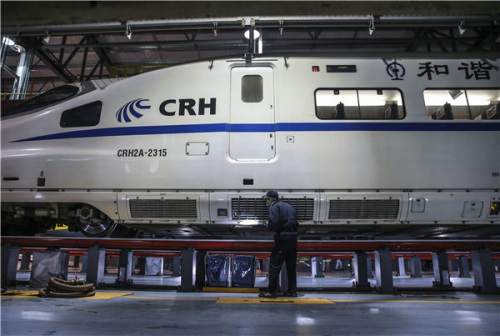
A worker checks the side of a bullet train in Nanning, Guangxi Zhuang autonomous region, on Feb 6. Chinese high-speed rail technology has gone global. (Photo/Xinhua)
International collaboration crucial during 'gold rush' era, expert says
The assembled cast at this year's two sessions shows how central innovation is to China's development strategy. [Special Coverage]
Some of the most high-profile figures at the ongoing first session of the 13th National People's Congress, China's top legislative body, and the 13th National Committee of the Chinese People's Political Consultative Conference, the top advisory body, are not politicians but entrepreneurs-Baidu's Robin Li, Tencent's Pony Ma, Xiaomi's Lei Jun, and JD's Richard Liu.
They help to advise the government on the future prospects of China's technological sectors such as telecommunications and e-commerce, as well as new frontiers such as artificial intelligence and autonomous transport.
This year's two sessions will provide a crucial blueprint on how innovation can lift people out of poverty and establish China as a world leader in science and technology advancement, said Nathalie Cachet-Gaujard, director of innovation at the China-Britain Business Council.
"There has been this rapid takeup of innovation in China. It's exploded exponentially," Cachet-Gaujard said. "AI is advancing very rapidly. The space program and telescope advancements are tremendous achievements. China is expecting to launch the first 5G applications and devices in 2018. And depending on which metrics you are using, China is either just behind or perhaps ahead of the United States in terms of published scientific papers."
Cachet-Gaujard said Chinese high-speed rail technology and bike-share programs have gone global, one in three "unicorns"-or startups valued at $1 billion or above-is born in China, and the country is now the largest market for electric vehicles.
Cachet-Gaujard, who was a lecturer at Xiamen University in Fujian province and worked in the software and telecom industry in Beijing, said during this "gold rush" period of innovation, international collaboration is crucial.
She said she hopes the government will look to take a seat at the table in creating international standards for research and managing the development of artificial intelligence.
"Increasingly, people are saying there needs to be a context in which AI is developed," Cachet-Gaujard said. "Deciding how humans are going to interact with AI, and how AI is going to be managed is a global issue."
The internationalization of China's workforce will be key to ensuring China remains on the cutting-edge of AI and other areas of technological enquiry, she said.
In his Government Work Report delivered on March 5, Premier Li Keqiang said China would create incentives for Chinese studying abroad to return and incentives to recruit foreign talent.
"It's encouraging that China hopes to attract more diverse talent," Cachet-Gaujard said. "In a lot of these new areas, countries will be going after the same talent, so it's going to be very competitive."
The premier also said the government would look to extend tax policies that benefit angel investment and venture capital, a move Cachet-Gaujard supports. However, she is concerned that limitations on the movement of capital could stymie innovation.
"Sometimes, companies in China may not be able to invest as much as they want in companies outside of China," Cachet-Gaujard said.
"It means that companies invest more in China, which can lead to an overvaluation of companies in China. It also means there is not enough cross-pollination in different markets, which prevents the progress of innovation."
She said that in order to meet global challenges, countries need to work together.
"The global consensus which was set in the G20 Summit in Hangzhou in 2016 is the right way forward," she said. "China staying open and contributing to international collaboration in innovation is going to be key to solving current global challenges."


















































